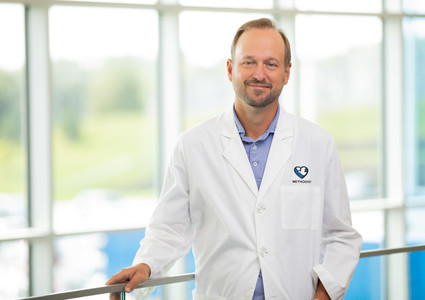
Inspiring Stories
‘More Than an Appendectomy’: Patient Receives Physical and Mental Healing From Methodist Care Team
Published: March 31, 2022

She eats healthy, stays active, rarely drinks alcohol and has never smoked, but Marti Shearman-Lasher admits she’s “bad at going to the doctor.”
“Honestly, I haven’t had great luck with many of them,” the 39-year-old wife and mother of four said. “And unless I’m on my death bed, you really won’t find me making an appointment for myself. I don’t have time. My life revolves around my kids.”
In fact, she’s not sure what panged her more last January – the paralyzing chest and stomach pain she had suddenly fallen ill to after ignoring similar discomfort for weeks prior, or the fact that she couldn’t fight through it this time to make it to her son’s basketball game.
“I told my husband, ‘You go to the game. When you get back, I may need you to take me to the hospital.’”
A Surgical Solution
On the way to the hospital, Marti’s pain had made it difficult for her to think of anything but the worst.
“My mom was diagnosed with cancer at 39, and my father passed away at 59 from a heart attack,” she said. “So I think there was some underlying concern that maybe this was something serious, too.”
At an emergency department close to home, Marti’s heart checked out fine, but her appendix was inflamed. She was transferred to Methodist Hospital, where she met general surgeon, Paul Kolkman, MD, who proposed an appendectomy – or the surgical removal of her appendix – to avoid serious complications. But he wasn’t certain that surgery would ease her pain, as Marti was experiencing more than classic appendicitis symptoms.

“With appendicitis, you typically see pain around the belly button that starts to migrate toward the right lower quadrant,” Dr. Kolkman explained. “You might also have some nausea, vomiting, diarrhea and fever.”
Marti was also experiencing chest pain, shortness of breath and painful urination. She was desperate for relief. So she agreed to go through with the surgery – a fairly routine procedure involving three small incisions needed for a camera and tools to locate and section off the appendix before it’s removed.
“After surgery, everything seemed to calm down,” she said. “I felt wonderful.”
Physical and Mental Healing
Even more wonderful than finally feeling comfortable, Marti said, was her short-lived hospital stay, in which she found herself under the care of some of the most compassionate people she’s ever met. Marti returned home the day after her surgery with a renewed appreciation for physicians.
“I thought the world of him – the absolute world of him,” she said of Dr. Kolkman. “He listened – really listened to what I said and used his head to read what I didn’t know how to communicate.”
“If you don’t listen, you’re probably not going to come up with the right diagnosis, and you’re not going to ever be able to address their concerns,” Dr. Kolkman said. “You can’t just go in with a plan and stick to it no matter what the patient says. You always want to make people feel like they’ve been heard.”
Nearly three months later, Marti is still blown away by the caliber of care she received from him and her entire nursing team.

“They were so on point, with a methodology to everything they did,” she said as she began to cry. “And they were so observant of my pain! For someone who doesn’t like to complain, they were able to see that I was hurting and sad – that it was hard for me to relax. They were so in tune with my physical symptoms and the mental struggle I felt with not being home with my kids – for missing that basketball game. They put me at ease physically and mentally. It makes me emotional just remembering how great they were.”
Seeking Care Where You Matter
Now, as Marti battles other health challenges, she can’t help but wonder if it’s all catching up to her – if years of neglecting primary care and preventive health maintenance is culminating in one uphill battle after another. She urges women – especially busy moms – to be their own advocates and take care of themselves.
“If you Google appendicitis, you’ll find a cartoon man lying in the fetal position on the couch,” she said. “That’s the position I was in when I told my husband to go to that basketball game. I’m not saying go Google your symptoms and diagnose yourself. But had I known more information about appendicitis, maybe I would have acted quicker. Moral of the story: Listen to your body. Go to the doctor when it’s telling you to. Heck, go to the doctor when it’s not telling you to.”
And above all else, she added, go where you matter.
“I think at Methodist, The Meaning of Care changes based upon each individual patient. There, I was more than an appendectomy. There, you know, it was, ‘You’re not patient 563-4. You’re Marti. These are your symptoms. How are you feeling now?’ Their Meaning of Care is tailored to a specific person who has a name, a husband and four kids. They gave a damn. They made me feel like I really mattered.”
More Resources
- Learn more about surgical services at Methodist.
- Read more inspiring stories of Methodist patients and staff.
- Learn more about endometriosis – a common cause of painful cramping in women.
- Do you have gallstones? Learn more about the painful condition and treatment options.


